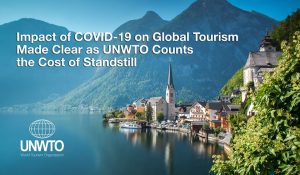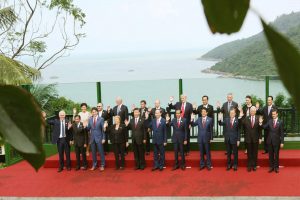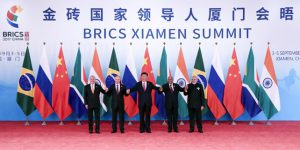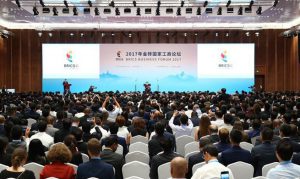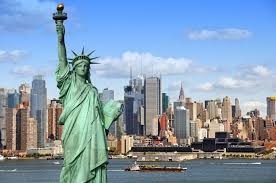Nepal- India Joint Statement
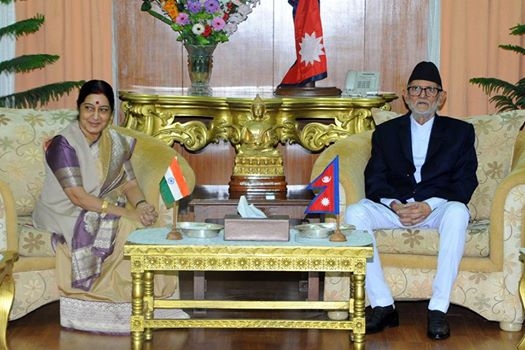
Joint Press Statement on the Official Visit to Nepal by Smt. Sushma Swaraj, Minister of External Affairs, Government of India
1. Her Excellency Smt. Sushma Swaraj, Minister of External Affairs of the Government of India is on an official visit to Nepal on 25-27 July 2014 at the invitation of Hon’ble Mr. Mahendra Bahadur Pandey, Minister for Foreign Affairs of the Government of Nepal. The delegation includes Smt. Sujatha Singh, Foreign Secretary, Ms. Sujata Mehta, Secretary (ER&DPA) and other senior officials of the Government of India.
2. H.E. Smt. Swaraj paid courtesy calls on The Rt. Hon’ble Dr. Ram Baran Yadav, President of Nepal, The Rt. Hon’ble Mr. Sushil Koirala, Prime Minister and The Rt. Hon’ble Mr. Subash Chandra Nembang, Speaker of the Legislature-Parliament. She also met with the Leader of Opposition in the Legislature-Parliament The Hon. Pushpa Kamal Dahal ‘Prachanda’ and leaders of other political parties.
3. Hon. Mr. Pandey and H.E. Smt. Swaraj co-chaired the third meeting of the Joint Commission, leading their respective delegations on 26 July 2014. The meeting was held in an atmosphere of utmost cordiality and warmth. The Hon. Minister hosted a dinner in honour of H.E. Smt. Swaraj.
4. The Joint Commission was formed in 1987 at the Foreign Ministers’ level with a view to strengthening understanding and promoting cooperation between the two countries for mutual benefits in the economic, trade, transit and industrial fields and in the multiple uses of water resources. Both Ministers expressed happiness at the reactivation of the Joint Commission after a gap of 23 years and underscored the importance of the Commission in furthering bilateral relations and cooperation.
5. The Foreign Minister of Nepal warmly welcomed his Indian counterpart. He thanked the visiting External Affairs Minister for accepting the invitation and choosing Nepal as one of her early foreign trips. He stated that her visit would help further strengthen the bonds of ties between the two countries and expand and deepen the scope and dimension of cooperation. The Minister of External Affairs of India thanked The Hon. Foreign Minister of Nepal for the invitation and warm hospitality extended to her and her delegation since their arrival. She expressed that her visit to Nepal demonstrates the importance that her Government attaches to good, neighbourly relations, particularly with a friendly country like Nepal with which India shares an ancient, deep-rooted and vibrant friendship based on shared civilisational ethos. She expressed the willingness of the Government of India to explore further areas of mutual cooperation and promote partnerships, while reinvigorating the existing mechanisms for enhancing mutual benefit between the two countries.
6. Both foreign ministers shared that both countries hold similar views on major international issues affecting the developing countries and work in close coordination with each other in the United Nations and other international fora. The Nepalese side reiterated its support for India’s candidature for permanent membership of the UN Security Council.
7. The Nepalese side welcomed the forthcoming visit of H.E. Narendra Modi, Prime Minister of India, to Nepal.
8. The Joint Commission reviewed the entire gamut of Nepal-India relations. It affirmed that the Joint Commission would make an important contribution to further strengthen the traditionally warm and close relations and add new dimensions in the areas of cooperation. The two leaders underlined the importance of timely meeting of the Joint Commission in the future.
9. The Joint Commission reiterated the need for reviewing, adjusting and updating the Treaty of Peace and Friendship 1950, reflecting the current realities. It directed the Foreign Secretaries to make necessary recommendations. The Joint Commission also directed the Nepal-India Boundary Working Group to commence field works at the earliest.
10. The two Ministers expressed satisfaction over the ongoing cooperation in defence sector. They expressed happiness over the ongoing cooperation between the security agencies of both countries and emphasized the need for promoting greater collaboration and cooperation in combating cross-border crimes. They reiterated the commitment of their respective Governments not to allow their territories to be used against each other.
11. The two sides noted the significance of enhancing productive capacity in agriculture to positively impact on livelihoods of the people. The Indian side would continue to supply chemical fertilizers to Nepal and extend cooperation for the establishment of a Deemed Agricultural University.
12. The Nepalese side appreciated India’s continued technical and financial cooperation in building physical infrastructures including roads, railways and bridges.
13. The two Ministers stressed the need for further enhancing bilateral trade and investment to foster mutually beneficial economic growth and development. They noted Nepal’s trade deficit with India and agreed to take effective measures to address the problem. Both sides stressed the need to complete necessary formalities to enable entry into force of the Bilateral Investment Protection and Promotion Agreement (BIPPA). In order to promote Nepal’s exports to India, the Indian side agreed to further relaxing the rules of origin requirements; simplifying and streamlining transit and customs related procedures; eliminating TBT and making the SPS related measures less stringent; and lifting quantitative restrictions on the export of Nepalese products to India.
14. Both sides directed the concerned authorities to conclude pending Letters of Exchange (LOEs) at the earliest with a view to facilitating trade and traffic in transit.
15. The authorities concerned have been instructed to carry out the works of the Terai Roads under Phase I projects with utmost priority and commence the Phase II projects by concluding agreement as soon as possible. The Joint Commission agreed that the construction of Tanakpur-Mahendranagar Link Road should be expedited. It also underlined the need for expediting the construction work of the cross-border railway connectivity.
16. The Joint Commission directed the concerned authorities to accelerate the construction works in the Integrated Check Posts (ICPs) to bring them into early operation.
17. The two leaders underscored the importance of harnessing vast hydropower potentials of Nepal for mutual benefits. They directed the concerned authorities to finalize the text of a Power Trade Agreement at the earliest. While noting the finalization of the Terms of Reference of the Pancheswar Development Authority, they directed the concerned authorities for early completion of the DPR of the Pancheshwar Multipurpose Project.
18. The Joint Commission expressed satisfaction over the implementation of 400 kV Dhalkebar-Muzaffarpur Double Circuit Cross-Border Transmission Interconnection and noted that the transmission interconnection would integrate the power grids on the two sides of the border and pave the way to initiate unfettered flow of power between the two countries. The Joint Commission decided to expedite the construction of 132 kV Kataiya-Kusaha and 132 kV Raxaul-Parwanipur Transmission Line Projects so that the transmission lines would help import additional power from India in the short term and help address power deficit situation in Nepal.
19. Both sides expressed satisfaction over the near completion of river training works over Lalbakaiya, Bagmati and Kamala. They also discussed other river training works over Dodha, West Rapti, Mohana and Lakhandehi.
20. The Joint Commission welcomed the signing of MOU on the installation of 2,700 shallow tube-wells in the terai region.
21. The Nepalese side appreciated the continued Indian cooperation in human resource development of Nepal. It welcomed India’s decision to increase scholarships for Nepalese students and expressed the hope that such scholarships would be processed through Government channels.
22. The two sides discussed construction of an international cricket stadium at Pokhara and continuation of Goitre Control Programme. The Indian side agreed to arrange for necessary equipment and other assistance for an early operationalisation of the Bharat-Nepal Maitri Emergency and Trauma Centre.
23. The Nepalese side would take necessary steps for the extension of Small Development Programme, which both sides agreed to align with Nepal’s development programmes and priorities. The Nepalese side would also look into the matters pertaining to benefits to the Indian teachers working in Nepal.
24. The Joint Commission noted the satisfactory progress in the projects covered under the EXIM Bank Lines of Credit (LoC). At the request of the Nepalese side, the Joint Commission acknowledged the need to relax the requirement of Indian content for the road projects included in the US$ 250 million LoC and agreed that the Indian content requirement would be reduced to 50 %. It called upon the LoC Review mechanism to expedite the works of the projects identified under the US$ 250 million LoC and agreed that EXIM Bank funding could be used for bigger projects with greater socio-economic impact in future.
25. The Joint Commission appreciated the ongoing bilateral cooperation in culture and tourism sectors and agreed to further expand and deepen cooperation in these fields. It discussed the possibilities of extending cooperation for the development and conservation of Pashupati, Lumbini, Janakpur and Barahachhetra areas.
26. H.E. the External Affairs Minister of India extended an invitation to The Hon. Foreign Minister of Nepal to pay an official visit to India. The Hon. Foreign Minister of Nepal accepted it with pleasure. Dates would be worked out through diplomatic channels.
Kathmandu, 26 July 2014


